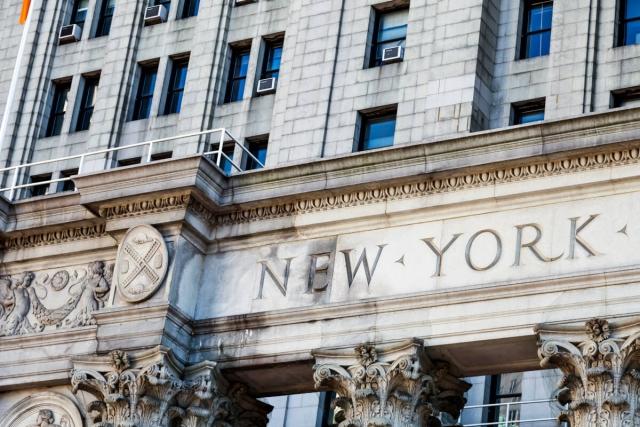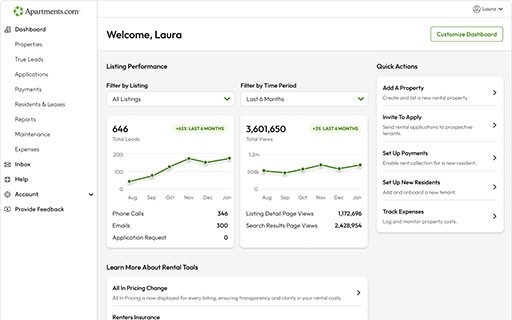
Being a landlord comes with its challenges, particularly in a booming market like New York. With exorbitant costs, growing demand, and unique compliance standards, the city’s rental landscape can be overwhelming for landlords and tenants alike. However, with the right resources and understanding of local laws, navigating the New York rental market can be a manageable and profitable experience.
In this guide, we’ll explore the basics of New York rental laws and regulations to ensure your landlord journey in the Big Apple is smooth, compliant, and successful. From key landlord-tenant laws and practical compliance tips to the latest updates in legislation, we’ve got everything you need to succeed in one of the most dynamic rental markets in the world.
Key Takeaways:
- Rent increases are tightly regulated: For rent-stabilized units in NYC, rent increases are currently capped at 2.75% for one-year leases and 5.25% for two-year leases, with new limits set to take effect in October 2025.
- Evictions now require ‘good cause’: Under the 2024 Good Cause Eviction law, landlords can no longer evict tenants or deny lease renewals without a legally valid reason, and rent increases are limited to inflation plus 5%, capped at 10%.
- Broker fee rules have changed: As of June 2025, the FARE Act prohibits landlord-representing brokers from charging tenants, shifting the responsibility for broker fees to landlords and mandating full disclosure of all upfront rental costs.
- Security deposits are strictly limited: Landlords can only collect one month’s rent as a security deposit, must return it within 14 days of move-out, and provide an itemized list of deductions if applicable.
- Short-term rentals face strict regulation: Local Law 18 requires all short-term rental hosts in NYC to register with the city and bans platforms from processing bookings for unregistered units.
Overview of Rental Laws in New York
Whether you are setting rent prices or screening tenants, make sure to keep an eye on New York’s rental laws. The city’s legal parameters span all different property management sectors, meaning every step of the leasing process must meet a certain level of compliance.
If you’re not equipped with New York legal knowledge, read below as we break down each relevant New York rental mandate and offer compliance tips:
Rent control and rent stabilization
Rent control and rent stabilization are prominent in New York’s rental landscape. Though similar, each of these terms means something different for landlords looking to increase rent.
Rent stabilization limits how much a landlord can increase rent each year. In New York, the NYC Rent Guidelines Board determines these rent increase limits, which are subject to change based on economic factors like real estate taxes, sewer/water rates, vacancy rates, gross operating maintenance costs, and overall housing supply. Current guidelines limit rent increases to 2.75% for one-year leases and 5.25% for two-year leases. However, the limits will soon reset in October 2025.
Rent control in New York includes pricing limits governed by the Maximum Base Rent (MBR) system. This system establishes a maximum allowable rent for regulated units, which can be adjusted every two years to account for changes in operating costs. Property owners who certify that they are providing essential services and have resolved all violations may apply for rent increases. However, these increases are capped at the lower of two limits: either the average of the five most recent annual rent increases approved by the Rent Guidelines Board for one-year renewal leases, or 7.5% per year, until the rent reaches the MBR. Tenants retain the right to challenge these increases if they believe the property still has unresolved violations or if the owner's expenses do not justify the adjustments.
The Housing Stability and Tenant Protection Act, passed in 2019, established additional legal parameters on rent increases, including the following protections:
- Rent increases for major capital improvements are capped at 2% annually.
- Landlords can no longer raise rent by 20% when a unit becomes vacant.
- Rent-stabilized units can no longer lose their status when rent reaches a specific threshold.
- Tenants paying preferential rent as of June 14, 2019, can continue paying that amount as long as they stay in the unit. If they move out, landlords may raise the rent to the legal limit.
Eviction procedures
New York landlords must abide by certain steps to lawfully evict a tenant. First, they must provide proper notice, which varies depending on the reason for the eviction. Generally, the reason for eviction falls under at least one of the following categories:
|
Reason for eviction |
Notice required |
Proceedings |
|
Missed rent payment |
14-day “pay or quit” notice |
The landlord must give the tenant two weeks to make the payment. If they fail to do so, the landlord can proceed with the eviction process. |
|
Violation of the lease |
10-day notice to cure |
The landlord must issue a 10-day notice to cure. If the tenant doesn’t rectify the situation in that window, the landlord can proceed with a 30-day termination notice before eviction proceedings. |
|
End of lease term |
30-, 60-, or 90-day notice (based on length of lease) |
If a tenant remains on the property after their lease terminates, the landlord may initiate an eviction case in Housing Court. |
After issuing the required notice, New York landlords must follow the strict eviction process, which involves meeting with the NYC Housing Court. This sequence can be broken down into the following steps:
- If the tenant doesn’t comply within the notice window, the landlord can then file an eviction petition with the NYC Housing Court.
- The petition is then delivered to the tenant, who has the right to contest the eviction in court. Tenants can qualify for free counsel under NYC’s Right to Counsel program if they’d like legal representation.
- The landlord and tenant present their case in NYC Housing Court.
- The judge evaluates the provided evidence, such as renter payment history, lease agreement guidelines, rental inspection reports, etc.
- The judge makes a decision. If it’s in favor of the landlord, the eviction proceeds. However, tenants have the right to appeal and delay the eviction.
- If the landlord wins, a warrant of eviction is issued to the tenant. This legally outlines the time window in which the tenant must evacuate the property, typically two weeks.
Lease agreement rules
Lease agreements in New York can be recognized orally or in writing, depending on the length of the lease. Oral agreements for leases of 12 months or more cannot be legally enforced, as well as those for rent-stabilized properties. Ultimately, it’s advised to get the lease terms in writing, as it provides complete clarification of the following key components:
- Contact information and basic info: Landlord’s name and contact information, property address, lease term, renter’s name and contact information
- Rent costs: Monthly rent rate, payment deadlines, late fees, and security deposit terms
- Utilities and maintenance: renter repair duties, maintenance request process, and assignment of maintenance and utility responsibilities
- Occupancy and roommates: legal occupancy limits and roommate notification requirements
- Landlord entry: timeline for regular property inspections and plans for emergency entry
- Community policies: noise levels, pet guidelines, pet fees, smoking rules
- Renewal and lease termination: notice periods for lease renewals
According to the New York State Residential Tenants’ Rights Guide, lease agreements must be free of jargon and confusing language. They must be clear, coherent, and easy to comprehend. Condemned lease provisions include:
- Exempting Landlords cannot be exempt from liability for injuries or damages caused by their negligence or that of their employees or agents.
- Tenants cannot be required to waive their right to a jury trial in personal injury or property damage lawsuits between parties.
- Tenants cannot be required to pledge household furniture as rent security.
- Landlords cannot be exempt from mitigating damages if a tenant vacates before the lease expires.
- The Warranty of Habitability cannot be waived.
- Tenants cannot be restricted from living with immediate family and/or one additional occupant and their dependent children.
Security deposits
The Housing Stability and Tenant Protection Act limits New York security deposits to one month’s rent. These rules apply to all property types, including rent-stabilized and market-rate units.
In addition to deposit caps, here are some other guidelines regarding security deposit collection in New York:
- Landlord must provide the tenant with a written receipt after collecting the security deposit.
- Landlords must place the deposit in an interest-bearing account if the property has six or more units. Any interest earned is granted to the tenant.
- Security deposits must be kept in a separate, interest-collecting bank account to prevent the landlord from using it for personal gain.
- Security deposits must be returned within 14 days of the tenant vacating the unit. If the landlord makes deductions, they must provide itemized lists outlining each deduction and its cost.
- Deductions are only permitted for property damage beyond normal wear and tear.
Price transparency and fee disclosures
The enactment of the Fairness in Apartment Rental Expenses Act in June 2025 laid new provisions for price transparency and fee disclosures, specifically regarding broker fees. In New York City, the landlord and their respective agents must provide tenants with an itemized, written disclosure of all upfront fees. The tenant must sign this disclosure before signing a lease.
Fair Housing compliance
New York landlords must comply with Fair Housing Act (FHA) guidelines and those set by the New York State Human Rights Law. Both legislations condemn discrimination against tenants based on race, familial status, color, national origin, religion, disability, or sex. The NYS Human Rights Law extends these protections even further, prohibiting discrimination based on creed, age, sexual orientation, gender identity or expression, marital status, military status, or lawful source of income.
These anti-discriminatory parameters apply to all housing opportunities in New York, with the exception of:
- one- or two-family owner-occupied buildings
- room rentals in single-sex housing, such as college dormitories or boarding houses
- housing for individuals 55 or older, or 62 or older
- room rentals in owner-occupied housing
Maintenance and habitability requirements
New York tenants have the right to habitability. This means that landlords must preserve the property, ensuring it’s safe and in working condition throughout the duration of the lease. A big part of maintaining this habitability is maintenance.
New York landlords are expected to conduct maintenance and address repairs within a reasonable time frame. If an emergency repair occurs, they must respond to the issue within 24 hours or as quickly as possible. For non-emergency repairs, the accepted time window is about 30 days. If the landlord fails to address maintenance issues in the allotted time, a tenant can go to local housing authorities, withhold rent, or even take the landlord to Housing Court.
It's also important to note that property owners have specific heating requirements to follow. They must provide hot water 365 days a year at a constant minimum temperature of 120 degrees Fahrenheit. They must also provide heat during “Heat Season,” which spans from October to June and follows the guidelines below:
- Heating requirements during the day: The inside temperature must be at least 68 degrees Fahrenheit between 6 a.m. and 10 p.m. when outdoor temperatures are below 55 degrees Fahrenheit.
- Heating requirements at night: The inside temperature must be at least 62 degrees Fahrenheit between 10 p.m. and 6 a.m.
What’s New: Recent Legal Updates for Landlords in New York
Now that we’ve discussed all the main pillars of New York rental laws, let’s explore some recent updates. From broker fees to eviction procedures, here are some of the latest legal developments to know as a New York landlord:
Good cause evictions
The Good Cause Eviction law went into effect in April 2024. Under its provisions, landlords cannot evict tenants or refuse to offer them renewal just because their lease has expired. Instead, they must have a “good cause” for eviction, such as:
- Missed rent payments
- Violation of the lease agreement
- Engagement in nuisance behavior
- Illegal occupancy of the property
- Landlord wants property for personal use
- Tenant uses the property for illegal purposes
- Tenant refuses to give landlord access
This law covers housing opportunities in NYC, Albany, Ithaca, Kingston, Poughkeepsie, Rochester, Beacon, Newburgh, Nyack, Hudson, New Paltz, Rochester, Fishkill, Catskill, Croton-on-Hudson, and Binghamton. Other localities may have their own unique protections.
The Good Cause Eviction law also provides rent increase protection. Under its provisions, landlords cannot increase rent when offering renewals by “unreasonable amounts.” According to the NYC Tenant Protection Cabinet, the local rent standard is set every year at the rate of inflation plus 5%, with a maximum of 10% total. If a rent increase surpasses this threshold, tenants can cite the Good Eviction law as a defense in court.
The FARE Act
We mentioned the FARE Act earlier when discussing price transparency, but it deserves its own feature. The FARE Act, formerly called the Fairness in Apartment Rental Expenses Act, went into effect in June 2025 and aims to enforce transparency and fairness throughout the NYC housing market.
The FARE Act prohibits landlord-representing brokers from charging fees to tenants. This means that whoever enlists the brokers must pay their commission, and that person is typically the landlord. This was a huge change from the previous system, where tenants were often responsible for paying a broker’s fee on top of several other move-in costs.
As mentioned earlier, the FARE Act also enforces fee transparency, requiring landlords and their brokers to disclose and advertise all fees up front when promoting a listing. This prevents tenants from being blindsided by unexpected fees throughout the rental process.
Short-term rentals
Another recent legislation to note is Local Law 18, which mandates short-term rentals in NYC. Enacted in 2022, this law requires short-term rental hosts to register their property with the Mayor’s Office of Special Enforcement and prohibits booking service platforms from processing transactions for those that aren’t registered.
For more information on recent changes in New York rental law, check out New York State’s Guide on recent legislative developments.
Compliance Tips for Landlords and Property Managers in New York
Compliance is always important for rental businesses. However, in complex markets like New York, it’s especially important to know the state and local rental laws. To ensure compliance in New York, we recommend the following:
Keep a pulse on local laws
New York legislation is always evolving. As a landlord, it’s important to keep a pulse on the legislative landscape to ensure compliance. Regularly review New York government websites to stay up to date on changes in your area.
Communicate with tenants
Regular communication is crucial for landlord compliance. Establish a contact line between you and your tenant, and be accessible to answer any questions or concerns they may have. This open line of communication can help prevent potential legal issues and ensure that both parties are on the same page.
Keep thorough records
Maintaining a collection of records is another helpful compliance tip. Keep copies of rental agreements, lease agreements, payment receipts, maintenance records, and all related documents. Doing so provides insurance in case of disputes or legal issues that may arise.
Ensure Landlord Compliance with Apartments.com
Managing legal responsibilities as a landlord can be challenging, especially with so many other priorities on your plate. From screening tenants to collecting rent, staying compliant and organized is no small task. However, with the right tools, it’s much easier to stay on top of everything.
That’s where Apartments.com comes in. Our comprehensive suite of Rental Tools simplifies the rental process while ensuring compliance at every step. From creating property listings to handling maintenance requests, we help you streamline your workflow while ensuring every action is fair, compliant, and aligned with your business needs.
This article is for informational purposes only and does not constitute legal, financial, or professional advice. For guidance specific to your situation, you should consult a qualified attorney or other relevant professional.
FAQs
Is rent control in effect in New York?
Yes, rent control applies to certain older buildings in New York City and a few other areas, but it is limited and applies only to specific tenants who meet eligibility criteria.
What’s the legal process for evicting a tenant in New York?
Landlords must provide proper notice (14 days for nonpayment, 10 days for a lease violation, or 30-90 days for other reasons, depending on the lease) and file a court case. Eviction can only occur with a court order.
Does New York require landlords to disclose all rental fees upfront?
Yes, New York law requires landlords to disclose all rental fees upfront, including application fees and other associated charges.
What is the maximum security deposit allowed in New York?
The maximum security deposit is one month’s rent for residential leases.











